#versus a character study where you realise they are in fact similar and would get on and they realise this about each other and fall in love
Explore tagged Tumblr posts
Text
i feel like my idea of “enemies to lovers” is so different from other peoples idea of it..
to me enemies to lovers is NOT people who hate each other and everything they stand for and then love each other
it IS people who have conflicting ideas/ideologies, mis (or not fully conceived) understandings of each other grow to realise they understand each other, know each other and then love each other
#using the term enemies very loosely#like to me#it’s kind of a surface description of the characters being opposites and that makes them enemies in the writing#versus a character study where you realise they are in fact similar and would get on and they realise this about each other and fall in love#mainly this is to booktok#bc their enemies to lovers are like… weird and kinda dodgy and unhealthy#enemies to lovers#enemies to lovers trope#book tropes#trope#book trope#romance
4 notes
·
View notes
Text
Exaggeration and puppets
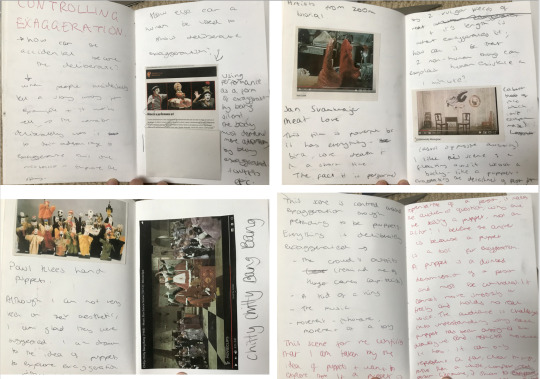
I decided to begin researching controlling exaggeration through how humans do it in performance, rather than verbally. This is because when humans perform with their bodies, it is always controlled and often exaggerated. For example in mime, exaggeration is the bases of the performance, the silence demanding more attention on the movement of the body and each movement emphasised to represent simple emotions.
I watched the animations of Jan Svankmajor, ‘Meat Love’ being one which really stood out. I found it so powerful because it had everything - birth, love and death. The fact that it is performed by two vulgar pieces of meat and its length is what exaggerates it; how can it be that two nonhuman things can explain human existence in a mere 1 minute?
In my zoom tutorial with Luke it was suggested I looked at Paul Klee hand puppets. I was not taken by their aesthetic but was drawn to the idea of puppets to explore exaggeration. Citing Chitty Chitty Bang Bangs ‘music box dance’ scene, this temptation became stronger. I realised everything in it was centred around exaggeration, the crowds outfits, a kid of a king, the music, and most of all the inhuman movement of a toy on a person. It made me wonder; If a puppet is representative of a person, it makes the audience question why are we seeing a puppet, not an actor? I believe the answer is because a puppet is a tool for exaggeration. A puppet is a dumbed down version of a person and must be controlled. It cannot move smoothly or freely and holds no real voice. The audience is challenged into understanding why each puppet has been assigned the dialogue and movement it has. It can only represent a few, clear things, rather than a whole complex, real person. Like mime, it shows that to exaggerate you must simplify.
youtube
youtube
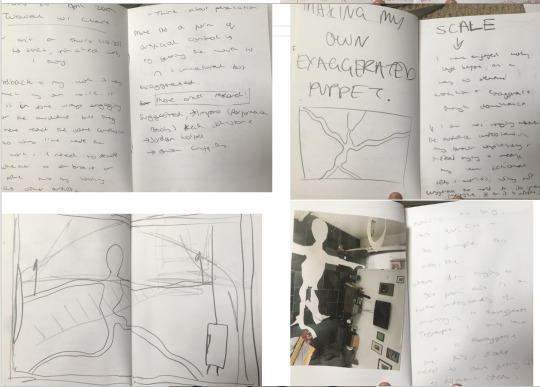
Running with the idea of simplifying to exaggerate, I decided to make a plain puppet the size of my living room. I have enjoyed working large before and think it is a simple way of exaggerating something as it demands attention and makes the audience wonder why it is so big. By making it plain I was able to focus on exaggerating only one thing; the size.
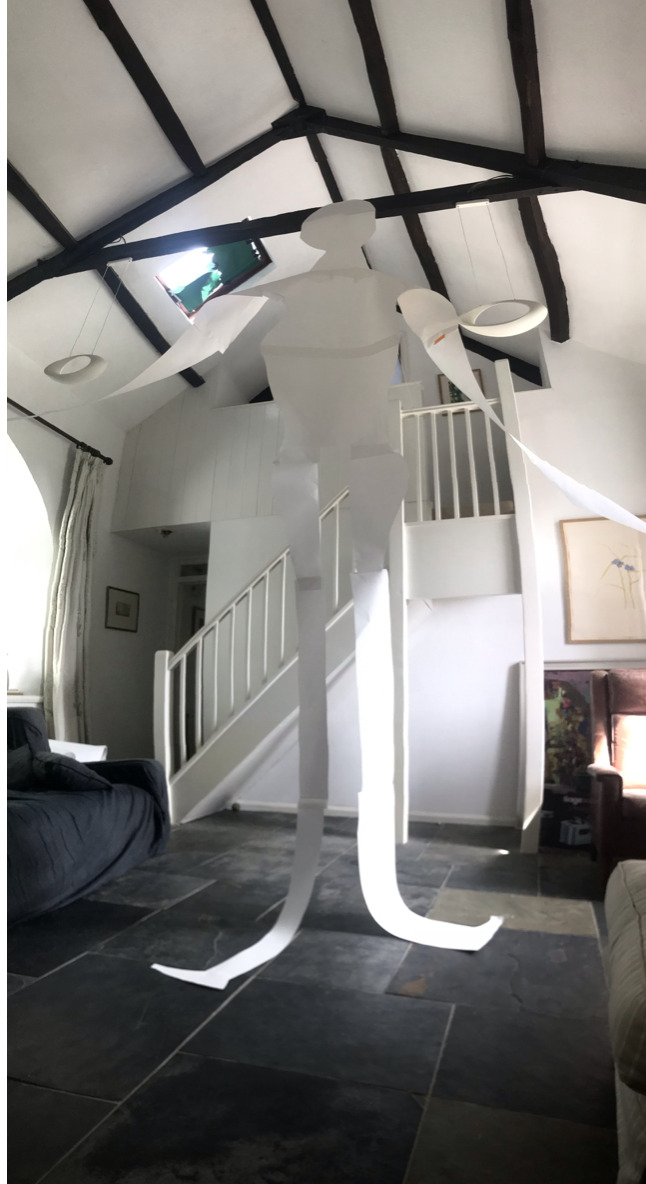
I was happy with the outcome, I find it unsettling and like how it almost looks normal. It reminded me of the Alice and wonderland scene where she fills the whits rabbits house. Looking to Jordan Wolfsons puppet at the Tate and 2014 piece ‘Female Figure’ I felt that although I find his work difficult to watch, I like that he creates one puppet to focus on one thing. It shows why exaggeration works so well in puppets, because they can only show so much, you have to pick one thing/ characteristic and amplify it.
Brian Griffiths puppets showed me something similar, the explanation for his exhibition being ‘the puppet in its purest form and motion resembles something of the artifact, tool, machine or musical instrument. They are contradictory things to be looked at and spoken through, that are animated and brought to life via imagination and will’.
Puppets are merely a tool for what we, humans, want to talk about further, the things we want to exaggerate.
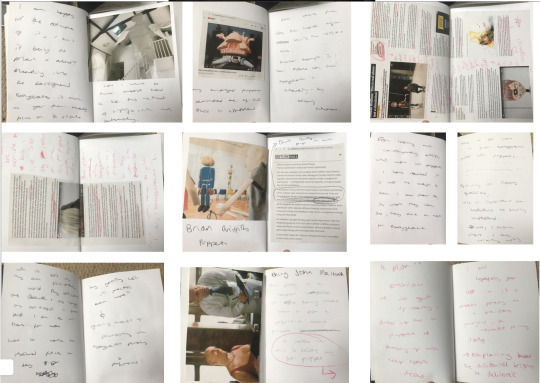
Lost with what interesting to do with this, I have decided to take on some advice I got in my tutorial that sometimes it is best to get lost in the process and not worry about the outcome. After watching the film ‘Being John Malkovich’ and discussing ideas with my brother and sister who I am in quarantine with, we have decided to get up early and create a one day project film, arriving dressed up as a puppet and seeing what happens, exploring how that accidental becomes the deliberate. Working with some floating ideas we already have, we are hoping a narrative will form itself. I hope this will be a successful way to work during this time of lack of events, conversations and coincidences which would usually create a clearer process.
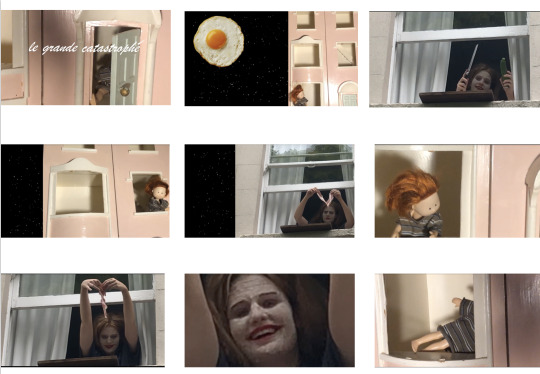

I am really happy with the outcome - we managed to create a short film in just one day ! We picked a doll that looked like me and used this as a starting point. Dressing up in the same top and doing my hair and make up, we began by finding places we could film which would look as if me and the doll where in the same place, wanting to play with the idea of realness and the artificial in puppets. This helped us a form a simple narrative about control and truth versus fiction. While I, supposedly human, cook a breakfast, the doll moves freely around the (doll)house. My movements become more and more manic until the breakfast becomes a live being who is controlling me ; I am in fact the puppet stuck in the dolls house and the plate of food is the thing left talking.
We used flour and makeup to create a slightly alarming and explicitly fake look, and playful music by Nina Rota. To exaggerate this all even further, we used ‘fake french’ for the script to further play on the ideas of a simplified, broken puppet, and as an exaggeration of French mime, whose character is often clumsy and clown like. The final line is ‘parceque, le grande catastrophe, of course c’est love’, spoken by the bacon and eggs face. This is a final half explanation of the mad puppet woman, but more so an exaggeration of the film, there has been no mention of love before this point, the script is almost nonsensical and this is humorous to end with something so grand and in some ways, untrue, and yet of course- it would be love.
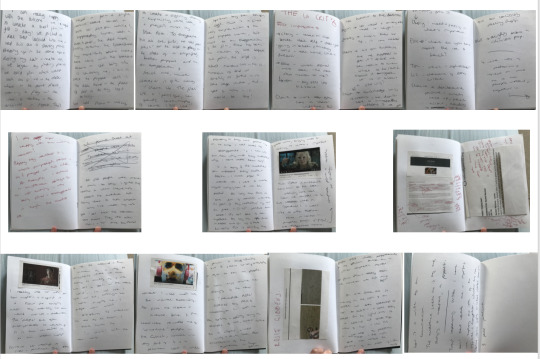
I was super happy with the reaction, that they realised it was about purposeful failure as a I played on this a lot, for example I edited in moments where I didn’t known I was being filmed and exaggerated them further, exploring the accidental coming the deliberate.
I found that at first people were unsure of what to say. I guess this touches on what Claire said in our tutorial about the audience not knowing what to think about why I’ve made my work yet I feel that this reaction was perfect. They were taken aback and then once they started discussing it they had picked up on the things I had tried to exaggerate. If I can do this, then why must they understand why I have made each thing? It is boring if the audience can understand every choice and decision - I much prefer to create work I want to create without worrying how it will be perceived. As long as there is some form of reaction and connection I think this is good, if they understand my mind then great and if not then perhaps even better? Its not bad to be a mystery ; as long as people are interested enough to start discussing. This is something my classmates agreed with, they said mood and feeling is what is important.
youtube
he video and audience reaction to the doll seeming more real than me reminded me of this scene in Stardust of the voodoo doll. I would like to further explore themes on control in puppets through simplified, over-exaggerated movement.
Rachel MacClean’s video work
youtube
I really like her work for how modern and absurd it looks. Her characters are often uncomfortable to watch and it seems like its own fantasy world. However her message is clear and political. She seems to be the absurd and and unknown as a way to exaggerate hat we are doing to society, as if we are out of touch with a ‘real world’. Im not sure I agree with his, although her work inspires me, I prefer work which celebrates the unknown as well as the known. I think humans are still ‘in touch’ with the world.
What I liked most was the visual extremity. Her films are vibrant and immersive. Some of her characters reminded me of ‘whoville’ from the grinch which I am very fond of. It is a peculiar look in which a person is still recognisable but it feels uncomfortable to refer to them as people.
Her work also reminds me strongly of the new film ‘Paradise Hills’ directed by Alice Waddington. In both the sets, costumes and editing carry an aesthetic of rich, current culture as a vibrant, almost sickly and tacky look. Also reminiscent of the capitalists in hunger games.
vimeo
Rosie Gibbens is another artists whose performances in my opinion take on a similar aesthetic as well.
Her piece which really took me however was this one, where on one screen she is moving in the form of an animal, with bras attached to her to distort her usual body shape and on the right screen is a zoomed out birds eye view of her. I like this contrastof perspectives and although I do not care for what the point of the script, I like how it is written as an examination. The audience feels as if they are studying a creature, a puppet.
Through researching artists I have learnt that visuals are very important when exploring this idea of the artificial and exaggeration. Whether this be costume, camera angles or literal visual examples of fake products.
In my tutorial notes Ellie wrote ‘Keep pushing your story-telling through film and explore how using even more different styles can contribute to the absurd worlds you’re building. It would be interesting to see different characters and storylines as different chapters to this work.’
Reading ‘the absurd worlds you’re building’ pleases me to know this is how the audience is viewing my work. I now wanter to continue to explore the fictional using exaggeration and the artificial as a way to do this.
1 note
·
View note
Note
How 'bout a meta on Vin re: her relationship with the Jedi as a whole/individual Jedi, maybe compared to her relationship with the Kaminoans and/or the Senate?
give me a topic to write a meta about !

VIN’S relationship with the jedi versus her relationship with the kaminoans is vastly different, but there are many parts that are still, very similar ? i guess. she doesn’t respect the kaminoans as well, and maybe that’s a generalisation, because of course, it’s a whole planet. kamino is not just the cloning factory, but all vin knows of their kind is in the form of those that have done her harm, so she kind of … i don’t know. i guess she’s kind of racist towards them ? but it’s more difficult than that. she doesn’t bear ill-will to their species, but just to those she’s met, & when meeting any others that are unaffiliated with the kaminoan cloning factories, she will take a very long time to feel comfortable around them. the fact that when they are rather near she still mutters curses in mando’a & calls them ‘ long necks ’ shows how little she respects them as people. as scientists, she respects their knowledge, but that doesn’t mean she has to like them or accept blindly what they’ve done to her.
upon reflection, i see vin as having been born intersex, rather than just binary cis female, & that gives more reason, unfortunately, for the experimentation conducted on her as a child. i do not use that as an excuse for tragedy, as many writers i’ve seen in the past have done ( eg ; they’re trans because someone hurt them ! they’re gay because they had bad experience with the opposite gender ! etc. ), but i see the way the cloning facility kaminoans look at science, is in a way to that creepy-ish aesthetic ( i can’t think of another word ) that old, timey scientists did things. if you’re familiar with bi//oshock ; b//urial at sea, there is a scene where you traverse through a laboratory, and there are lots of tests on live subjects ; bonding, forced-pairing, etc. & then there’s the whole ‘ girl in the tower ’ ; watching her, studying her, that sort of thing. vin’s childhood was in a way, inspired by that. but when something unfamiliar & different happens, as was in her case, i don’t see them as simply disposing of it straight away, but studying it, & in vin’s case, this was studying her during her accelerated early development, & this came in the form of watching her through cameras, experiments & surgeries, & more. i won’t adapt more on her gender because i am uninformed, & do not want to say anything that may offend those that, or anything that comes across brash. it wouldn’t be my intention, but i’ve often unintentionally said ignorant things, with no ill-will behind it, but people have pointed it out, & i would like to avoid that, for everyone’s sake !
so, vin is especially not fond of the kaminoans, & it’s a sorry fact.
the jedi, on the otherhand … the first jedi she ever met, was shaak-ti, and shaak-ti basically saved her life. stopped her from being experimented on, from getting terminated. this did not miraculously cure vin’s trauma. it merely stopped more horrific things from happening to her. vin actually has surgical scars across her scalp from brain surgery many times ; trying to implant the inhibitor chip when she rejected it in fetal & cellular development. her body continued to reject it up until she was around … six ? so, she was physically maybe … 10 ? since she ages a little slower than others.
vin idolises shaak-ti, & she’s one of the only reasons to look forward to returning to kamino, after vin gets deployed. working with nihrik broadened her scope as well. she was still ct-9124 when she met him, & he approached a shaken & shy vin ( she had lived her whole life on kamino up to this point, & despite experiments ‘ ceasing ’, the kaminoans performed routine medicals & blood tests ; all excuses to continue those experiments in some little form ).
nihrik was definitely different for vin. he invited her to join the lionheart squadron, with other less able-bodied clones, & those that maybe the kaminoans didn’t want ( shaak, & many others, fought for a negotiation, that meant that as long as they could still fight, then they could be ‘ used ’ … it was the best they could do ). vin was at first repulsed & offended by that notion, though she didn’t let it on, because nihrik was the first one who had actually asked for her to be in his squadron. she didn’t see herself as less able-bodied, or as a burden to anyone. she was initially a little ableist, but mainly because she was confronted by the status given to her by others ; that she was a reject.
vin then met siri ( because this happened, & despite siri’s death, the siri that @tachiisms portrays, is so central to vin’s character ), and siri actually gave her her name. vin had fought with siri & her men as well, before her honorary initiation to the lionhearts, & siri had based her name on the word, ‘ vindicate ’, which is an exceptionally fitting name for her.
vin met braig in a timeline too, when she was on ‘ test deployments ’, once again, before joining the lionhearts officially, & before receiving her name, & he was very caring for his troops ; something she respected greatly.
her impression of the jedi as a whole is a little shaky, because at some point, she came into contact with boba, & he tried to wake her up from the dazed trance most clone troopers are about their status, & to the fact that she was just a pawn in a game. because of the inhibitor chip problems however, vin was already aware of all of this, heavily, & took offense because it was literally & purely ( at least in her opinion, because of course, the clones had no idea about the chip, & neither did she ) her choice. they met up many times, & became close friends over their views & beliefs. she & he would talk about jango sometimes, i presume, & vin would eagerly share her newfound knowledge of him with his son. initially, though, vin was envious of boba, for having what she thought of a life, no matter how horrible, but he also woke her up to how wrong that thought was. vin has contemplated running away with boba many times, & has packed her duffel bag many times, but she gets shaky hands & can’t do it, anxiety peaking too high. i know boba isn’t a jedi, but he’s very important to her view of them as well. he kind of made her realise more & more that the galaxy thought of her & her kind as disposable, & to tip-toe into the realm of the senate & her view of it, it really nosedived.
her lack of respect for the senate ( she was loyal to the ordinary people, not the politicians, she always thought ), started with the plasterings of giant posters of a clone trooper that looked like her, but was, 100% a cisgender male. her name was written in heavy lettering underneath it, & as commander of the lionheart squadron, she gained many fans, alongside her captain, tank. the galaxy saw her not just as disposable, but as someone she wasn’t. the senate had done this because, if everyone just saw the clones as 100% the same, they wouldn’t sympathise or humanise them as much. if they found out there were rejects, & living beings tossed aside & basically tortured ( because let’s be real here. vin never, ever, would’ve agreed to those experiments & she’ll hate those that did it to her forever ), then maybe they’d start rioting for ‘ clone rights ’, & there were enough of those hippie activists to last them. so vin was painted the same as every other clone. when more word got out, smaller, less talked about posters of her as herself were put up by defacto groups who fought for clone rights ( anakin & padme probably helped, to be honest, what with their stances on dehumanisation ), & it sparked conflict throughout those who knew.
vin hated the senate for that, because that was a mutual agreement throughout the parts of senate that were aware of it. padme, naturally, was heavily against it ; as was bail. the kindness that they both evidently show the clones is remarkable, so if vin knew, she could never hate them. still, she is loyal to the republic’s people, not its politicians.
i’m rambling a lot & this is probably getting wild, & way off topic ? but there’s a lot of different views here that i couldn’t possibly share. but i hope this answered a least a little of your question !
#child abuse//#child experimentation//#torture//#dehumanisation//#ableism//#racism//#those two are vaguely tbh i just want to tag it just in case#saggitariisms#❛ ʀᴇ ; ʜᴇᴀᴅᴄᴀɴᴏɴs. ❪ vin. ❫
2 notes
·
View notes
Text
Exclusive Interview – Richard Armitage on his new film Pilgrimage, connecting with his characters, and more
Alex Moreland chats with Richard Armitage about his new film Pilgrimage…
Source: flickeringmyth.com
July 9, 2017

What drew you to this project initially?
I was interested in the period; I’ve always been fascinated with that part of history. I remember in primary school, looking at Richard the Lionheart, and being interested in the Norman Conquest. In this particular version of the story, I was kind of fascinated with what the relevance was between a boy raised in the occupation in rural Ireland, and the conflict between a kind of peace loving group of monks versus this family, particular with Raymond De Merville as the young prince who had been raised with the traits of war hanging over him.
Thematically, the movie deals with ideas of faith and of strength of conviction and so on.
How did you connect with those ideas, and does that play a part in your own life?
I think the thing that really caught my eye when we were filming it is when the relic is finally revealed as this lump of rock; everyone’s kind of rested all their hope on it, and endowed this object with so much reverence and power, and it becomes like a perpetuating myth. I was interested in – I mean, in a way the character’s reaction in the story is to sort of scoff, and we kind of do the same in contemporary society. We endow things with so much importance, whatever our kind of gods are, it’s all about projecting something onto something which has no value. That’s a theme that runs through the film.
Do you think the film is critical of that perspective?
I think towards the end of the film, you start to realise that the author Jamie [Hannigan, the screenwriter] and the filmmaker [Brendan Muldowney, the director] are really studying the camaraderie and comradeship, and really celebrating life at the very moment when carnage is happening on that beach. He’s sort of suggesting that we shouldn’t place too much emphasis on these relics – is it really worth dying for?
When you’re watching the film back, is it strange to see yourself and your performance?
Yeah, it’s always a bit strange, and you know one of the things that I had to do was work on the French language. I was working in Canada when I first took on the role and started working on language, and I was being encouraged by Canadians, so I turned up in Ireland and the teacher there said “oh, you sound like you’ve got a Canadian French accent”. So, she started to show me it in an Irish accent – and when I went to the next place, they said I was speaking French in an Irish accent! The teacher there was Belgian, so I ended up speaking French in a Belgian accent! In a way, that was kind of the fun part of preparing the role; my ear was very much tuned to how the character sounded, so he fits truthfully in that world. I did enjoy playing him, he’s very dark, but I tried to find some of the springboards and the triggers to why he had become that way.
On that note, then – something you’ve spoken about before, that I find quite interesting, was this idea of looking for a certain dualism within your characters.
Could you tell us a little about what you mean by that? Did you find that same quality in your character here?
Yeah. I mean, with this character, it was quite difficult to find, but what I did – whenever you have the action of a character, which in Raymond’s case is to pursue the relic at all costs, even if his life is the cost of that, that’s quite a dark narrative, a dark agenda to pursue. You have to understand what’s driving him; even in the darkest moments, he’s still a human being, he has catalysts. One of those catalysts with Raymond is very much the sense that his father is fading and failing – he calls him a coward – and that somehow the family is going to collapse. It’s left in his hands to keep that family alive, and that by taking the relic and currying favour with his king he’ll somehow beat that. So, ambition is really at the centre of Raymond – and, to be honest, as an actor I’m able to relate to how ambition can be all-consuming at the expense of your life. It’s about finding a balance, and unfortunately Raymond didn’t find that balance.
Do you think the character is a straightforward villain, or does that ambition lend a certain ambiguity to it?
You know, I never saw him as a villain to be honest. I saw him as a kind of carrier of war; from a modern perspective, warmongering people are considered villainous, but I think in the brutality of the period we’re talking about, he would have been hailed as a hero or a champion, because he’s pursuing his agenda. But yeah, it was an incredibly kind of metallic taste in the mouth to work at that level.
Just to return to what you were saying about the different languages, something I found interesting about Pilgrimage is the way it uses language, often switching between them, and of course Jon Bernthal’s character had very little dialogue when you were acting alongside him.
How does something like that influence and affect your performance?
Well, I think everybody at some point was speaking not really in their native tongue, and it does help with the sense of being completely in another time, in the form of another character. I think it sort of forced the text into a bit more of a poetic narrative, that I think Jamie Hannigan really handled beautifully. But also, as you said, Jon Bernthal’s character doesn’t speak throughout the piece, but I could sense in him, in every moment, any interaction I had with him, that he did have lines of dialogue in his mind and he just wasn’t saying them. It’s something that I’ve always been fascinated by with characters; most of the time, you’re really not speaking the truth, you do have a lot of things that you want to say but you choose not to say. Silences are as important as the language itself – but yeah, again, I’m fascinated with language, so I found the whole thing interesting.
What you were saying there about that silence, that interiority – how much of the inner thought process and backstory to your character had you worked out internally?
Well, the writer gave me a number of goalposts – he came from Roeun [in France], and he had largely grown up in Ireland. The occupation had happened when he was quite a young man, probably when he was a teenager – so I just looked at the roots of his family, I looked at the lack of a present mother in his current situation. I think something that glared out in the film was the lack of any kind of female character or feminine energy – I think it really informs the style and the tone of the piece. I sort of built it from there, and I drew from some music and images to stand the character on. But really, because it’s so much of a kind of linear road movie, the background of the character was mostly decorative – it had to be about the here and the now and the next, which was really quite a nice place to be with this character, who’s so much of a driven, forward looking and ambitious character.
What sort of music and images did you use for this character?
There’s an artist, a kitsch artist called Odd Nerdrum, who I used a lot for this period. In fact, I found a huge book of his art and actually sent it to Brendan before we began shooting, because I felt like it really represented the world. There’s also an album by Joselyn Pook I used, which had a kind of spiritual sounding music, but at the same time it was very contemporary and electronic; I used to listen to that in the car on the way to the set every morning.
Is that something you do with all of your roles?
Yeah, I mean it’s a way of concentrating. Because there’s so much mental distraction when you’re working on a film, to have a piece of music that you can plug into can really focus your mind, and get yourself into the place you need to be quite quickly. So I do tend to use that, yeah.
When you’re working alongside an actor like Tom Holland – he’s roughly the same age now as you were when you first began acting, I believe – does that prompt you to reflect back on your career? Did you have any advice for him?
It does actually, yeah. You know, when I think about myself at his age, and he’s such a bold, brave and inspirational actor, I don’t think I had a fraction of the talent that he has at the age that I was. So I have a lot of admiration for him. He was so committed, and to see that commitment in such a young actor was amazing, and I think he’s going to have an incredible career ahead of him.
You’ve done a lot of theatre, film and television – how do you find the different mediums influence your approach?
It really depends on what’s going to be the requirements. So, when you’re working for theatre, I do tend to – it’s much more of a regime that you have to tend to settle into. You have to perform eight times a week for twelve weeks, so you have to build up stamina. It’s similar for film, but because you do it piece by piece you can kind of set your energy and spend your energy in a different way. But essentially preparing the role is pretty much the same; with the time that you have, you try to get as much detail as you can into the role. I write a lot, and again I listen to music, gather images for myself, and you try to transport your imagination to the place you need to be.
Do you have a preference as to which medium you’re working in?
I never saw myself as a film actor; I was always headed for the stage. But I seem to have worked more on film than anywhere else, and when you get to work on a piece of film I seem to feel that you have a certain amount of time, moreso than on television, and particularly with an independent feature, I feel like there’s much more broad experimentation. So, at the moment, I’m really enjoying working in relatively low budget independent features, because it’s the place where I get to stretch myself as an actor, and there isn’t a studio frightened about the risk you might be taking. So, at the moment, that’s the place where I’m the most excited to be.
How do you feel about the place of independent films within the industry at the moment? Do you feel they’re being given enough support?
I think it’s always a big fight, but I also believe that the multimedia platforms that are available now have opened up a much broader scale to get a feature made and seen. A cinema release is no longer the holy grail; Netflix or Amazon get involved, and they have a great platform to deliver a feature. I think people are watching the material in such different ways – watching a movie on a huge screen at home is no longer seen as a compromise. That’s good, because ultimately we just all want to be working, and making great movies. It matters less if it gets a cinema release or not, as long as something gets made.
Are there any roles you’d like to play, but haven’t been able to yet? Specific ones, perhaps, or different genres?
Do you know, I don’t really know. In a broad way, there’s a lot of historic figures that I’d love to play but I’m not quite old enough. There’s a character that I’m working on in a movie that I’m trying to produce with the Irish Film Board, based on a true story, that I’m really hoping I’ll be able to play at some point. I’d also love to do a science fiction piece; science fiction is something I studied for my English A-Level, and I’ve always been fascinated with it. The next project that I’m about to do dips its toe into science fiction a little bit, so that’s going to be interesting.
Well, that leads on nicely to my next question – is there anything you can tell us about any upcoming projects you might be working on at the minute?
Yeah. Well, the next piece that Julie Delpy has written, and she’s going to direct and produce it, and it’s called My Zoe. It’s a passion project of hers, and she’s been working on it for about ten years. It’s about a marriage, and what happens with a little girl; it begins as an interesting, quite tragic, family story, and then it just dips its toe into a little bit of science fiction.
Finally, then, what would you hope that audience members take away from Pilgrimage, and indeed your work in general?
You know, I hope that they are transported into a world and a time that feels very very alien to how we live now, but at the same time they can relate to the passions of these people centuries before, who are ultimately the same as we are now – full of ambition and full of rage and full of devout belief. I hope that we let our audiences relate to it. In terms of my own career, my work, I hope that the audiences don’t necessarily recognise me in the character, but that they see the character before they see me. That was the ultimate goal of playing him.
Richard Armitage, thank you very much!
#Canadian accent#Belgian accent French accent#LOL#no one was the good one#:)#richardinterview#richardarmitage
0 notes